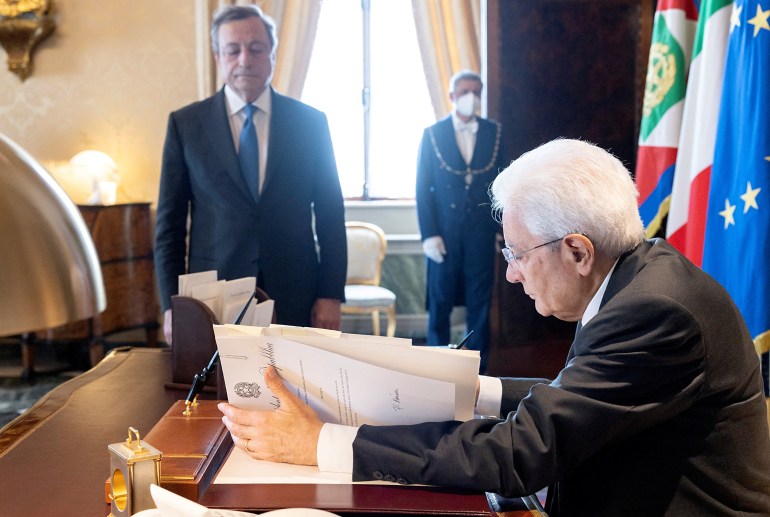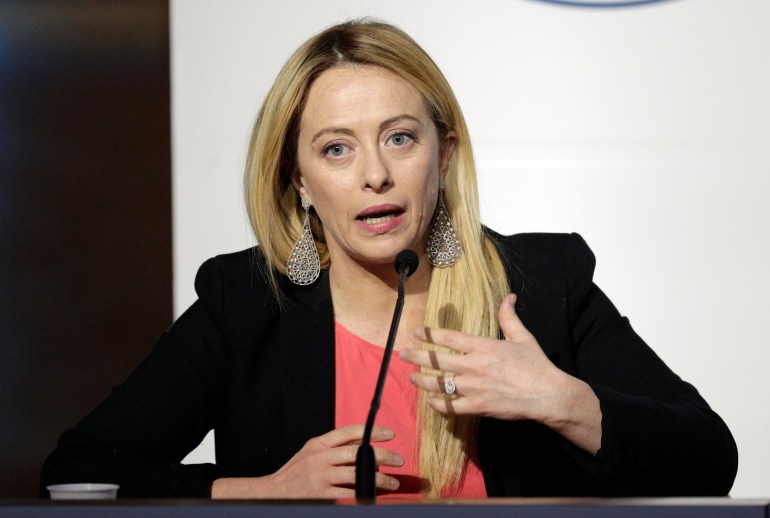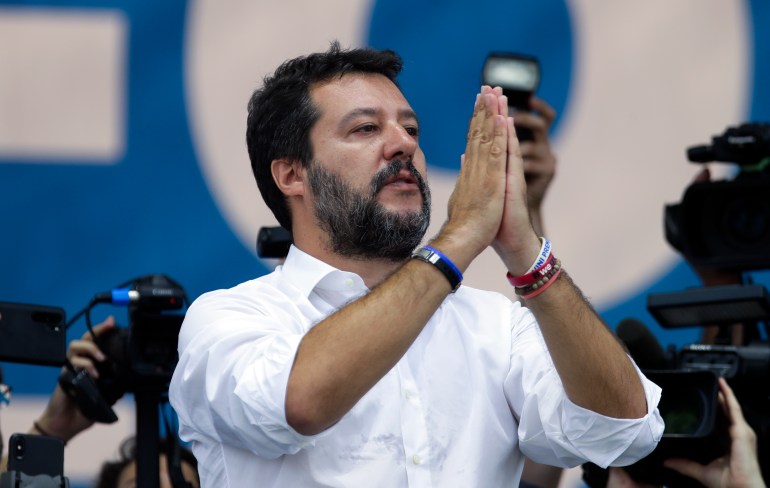Can Italy find stability with its upcoming election?
Italy is due to elects its new parliament on September 25 following a political turmoil that prompted PM to resign.

Italy has been finding itself in a political crisis for more than 10 years. The most recent example is Prime Minister Mario Draghi’s resignation that was prompted by the rejection of a confidence vote by three of his key coalition partners in July.
Draghi had convened the vote to heal divisions in the government and renew their fractured alliance.
Keep reading
list of 3 itemsItaly’s president dissolves parliament, calls snap election
What is next for Italy after Prime Minister Draghi’s resignation?
The country will elect a new parliament on September 25. Until then, Draghi continues to lead as acting prime minister.
Draghi had previously offered his resignation after the Five Star Movement failed to back him in a confidence vote on measures to tackle the high cost of living, but President Sergio Mattarella initially rejected Draghi’s bid to step down.

However, the Five Star Movement stood by its veto. In addition, Forza Italia and Lega decided to abstain from the vote.
Alessandro Chiaramonte, professor in political science at the University of Florence, told Al Jazeera that the recent developments displayed what Italy had been facing over the past 10 years.
“Since 2013, elections have not been decisive: no single party or coalition of parties has been able to win the majority of seats in both the Chamber of Deputies and the Senate and form a government on its own,” he said.
“As a result, governments have been formed by ideologically diverse parties following post-electoral agreements. This has also been the case of the current technocratic government led by Draghi, who recently resigned exactly because of the shrinking of its parliamentary base made up by almost all the relevant parties in parliament.”
Overcoming the gridlock caused by the lack of decisive elections will be pivotal for the next government.
Whether it is the soaring price of gas, inflation or rising poverty, Italy faces various challenges in the upcoming years.
Moreover, the European Union fears Italy’s next government could seek to redraw fundamental reform or investment commitments settled by Draghi in a deal with Brussels last year, which had Italy commit to reforms to reboot its underperforming economy, delaying or even jeopardising Italy’s receipt of grants and loans worth billions of euros.
As the third largest economy in the EU and the fifth largest provider of troops to NATO, Italy’s strength is pivotal for Brussels.
Key vote
All these factors make the upcoming election particularly important, Cecilia Sottilotta, assistant professor of international relations and global politics at the American University of Rome, told Al Jazeera.
“It’s the first general election in Italy since the beginning of the [coronavirus] pandemic for a country, which has been experiencing a slow-burn social, economic and political crisis for a long time,” she said.
The right-wing Fratelli d’Italia (Brothers of Italy) with party leader Giorgia Meloni, who has displayed a lack of distance from the former fascist leader Benito Mussolini and is considered even more radical than Lega boss Matteo Salvini, is projected to become Italy’s new prime minister. The opinion polls show 25 percent support for her.

Meloni and her party are part of a centre-right coalition that is currently polling at about 60 percent, and consists of former Prime Minister Silvio Berlusconi’s Forza Italia, Salvini’s Lega and other smaller parties.
Should this coalition win the election and the Brothers of Italy obtain the most votes, Meloni is likely to claim the post of prime minister based on informal internal rules of the coalition.
“As of the most recent polls show, the centre-right coalition of parties is expected to win a large majority in the upcoming election. In other words, unlike in 2013 and 2018, the outcome of the 2022 election is expected to be decisive,” Chiaramonte said.
“As for its historical roots, Brothers of Italy is clearly a far-right political party. However, Meloni has recently worked hard to give Brother of Italy and herself an appearance of moderation and international reliability,” she said. “Of course, we must carefully test whether this political repositioning is not just electoral manoeuvring.”
Favouring alliances
The Italian electoral law favours party alliances and coalitions, making understanding and an ideological fit between the potential partners pivotal.
Enrico Letta, party leader of the Partito Democratico (PD), the strongest centre-left party, has therefore been attempting to counter the superiority of the right-wing parties through an electoral alliance with various parties, the left, the Greens and Carlo Calenda’s moderate Azione party.
The parties agreed to carry forward the foreign and defence policies of Draghi’s current government. With the expansion of renewable energies, the alliance wants to make the country less dependent on energy supplies from Russia. It also intends to introduce the minimum wage provided for by the EU.
“The Democratic Party, supposedly a centre-left party, has completely lost its grip on the working class and has embraced Mario Draghi’s technocratic legacy,” said Sottilotta.

In addition, the election campaign of the centre-left parties focuses on preventing the right-wing coalition.
“The next election is a decision between an Italy among the big European countries and an Italy allied with [Hungary’s Prime Minister Viktor] Orbán and [Russia’s President Vladimir] Putin,” said a published agreement of the left-wing party alliance.
“Italy has always been a politically and economically fragmented country. The current electoral system incentivises parties to create coalitions to win in single-member districts. However, this does not mean that the coalitions will remain intact after the election,” Sottilotta said, referring to Forza Italia, Brothers of Italy, and Lega, who, despite running together, were unable to find common ground and dissolved their agreement only months later.
The centre-left coalition has encountered this experience over the past few weeks. The PD and Azione/+Europa needed other parties to join them to compete with the centre-right bloc.
However, PD’s recruitment caused Azione to leave the alliance already, making a win for the centre-left coalition even more inconceivable.
But Italy’s political situation is so confused that nothing seems entirely certain at this stage.
Electoral volatility
“Unsurprisingly, the country has been affected by a high level of electoral volatility over the past decade. Italians are eager to support actors which style themselves as anti-system,” Sottilotta said.
“The Five Star Movement did not exist four years before, won 25.6 percent of the vote for the Chamber of Deputies in 2013. In the same election, the Northern League won a meagre 4.08 percent of the vote for the Chamber of Deputies. Fast forward to 2018, and it won 17.4 percent of the vote,” she said.
“Now, the far-right Brothers of Italy party’s moment is under the spotlight. Brothers of Italy won 4.35 percent of the vote for the Chamber of Deputies in 2018, but according to opinion polls is projected to become Italy’s largest party as a result of the upcoming September 25 general election. If the actual vote is in line with the polls, it will be difficult to imagine a coalition government which does not include Brothers of Italy as a key actor,” Sottilotta added.
But even within the individual parties, volatility persists. Two current government ministers, Maria Carfagna and Maria Stelle Gelmini, recently left Forza Italia, stating Italy’s middle-right bloc had become “too extremist” and joined Azione.
Undecided voters
Moreover, 40 percent of the electorate are still undecided or do not want to vote on September 25, adding yet another layer of uncertainty.
However, if the projections hold, the new government will have the opportunity to create change for Italy, Chiaramonte said.
“If the centre-right is confirmed to be the electoral winner, the next government will have the advantage of being ideologically more homogeneous than all the previous Italian governments since 2011. From this point of view, the policy coherence of the governmental action should increase,” he said.
However, while the potential to end paralysis in Rome may exist, the downside of a centre-right government under Meloni will likely be felt abroad first and foremost.
“The international reputation of the future governing parties and leadership is low, particularly regarding their ability to fix the country’s economic problems in agreement with the EU partners and institutions,” said Chiaramonte.
“So, the real question is whether and to what extent the next government will continue to act as a reliable member of the EU and Western community in matters as crucial as economic policy, international affairs and alliances,” he said.